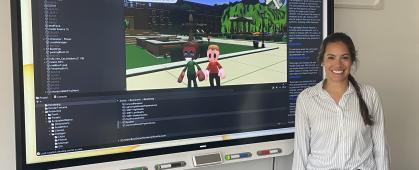SMART FIRES Year 2 Highlights 2025 - Special Edition Newsletter
This special edition provides an overview of the SMART FIRES project’s second-year achievements, highlighting its interdisciplinary research on prescribed fire using sensors, AI, and community engagement. It showcases progress across it's four research thrusts, welcomes new team members, and recognizes early-career researchers. Broader impacts include a summer educator workshop at MSU and STEM outreach at the Powwow.
Team News
View All News
2025 Seed Awards
The SMART FIRES Research Seed Award Program provides funding to support innovative research projects that align with the goals of the SMART FIRES NSF EPSCoR initiative, which focuses on advancing technologies and understanding around prescribed fire and its impacts on Montana communities. Open to faculty at Montana State University and the University of Montana, the program offers awards of up to $25,000 to fund activities such as equipment purchases, personnel costs, field data collection, and collaborative research.

Smart Optical Sensors for Fire and Smoke Science
The SMART FIRES project is leveraging cutting-edge technology to better understand fire behavior, smoke dispersion, and fuel conditions. Three key instruments—High Spectral Resolution Lidar (HSRL), All-Sky Polarization Imager (ASPI), and the Smart Unoccupied System Hyperspectral Imager (SUSHI)—are at the core of this effort. Each provides unique insights, and together they form a powerful toolkit for prescribed burn research and management.

Early Professional Career Development Awards
The 2025 SMART FIRES Early Professional Career Development awards provide support for early-career faculty and postdoctoral scholars at Montana State University in disciplines related to SMART FIRES, such as computer science, engineering, environmental science, economics, chemistry, and social science.

Advancing Prescribed Fire Training Through Immersive Simulation
Top-left: screenshot from the product demo; top-right: Johnson's Lab displays their $70K award; lower-left and -right: student lab members demo the team's product for the panel of judges. Johnson’s Lab, a team of graduate students led by Jesse Johnson, Professor of

Women in STEM feature: Morgan Hasenmyer
Where are you from?Mansfield, TXWhat do you like to do for fun?Play volleyball, hike, read and sewCan you describe your research?

2025 Seed Awards
The SMART FIRES Research Seed Award Program provides funding to support innovative research projects that align with the goals of the SMART FIRES NSF EPSCoR initiative, which focuses on advancing technologies and understanding around prescribed fire and its impacts on Montana communities. Open to faculty at Montana State University and the University of Montana, the program offers awards of up to $25,000 to fund activities such as equipment purchases, personnel costs, field data collection, and collaborative research.

Smart Optical Sensors for Fire and Smoke Science
The SMART FIRES project is leveraging cutting-edge technology to better understand fire behavior, smoke dispersion, and fuel conditions. Three key instruments—High Spectral Resolution Lidar (HSRL), All-Sky Polarization Imager (ASPI), and the Smart Unoccupied System Hyperspectral Imager (SUSHI)—are at the core of this effort. Each provides unique insights, and together they form a powerful toolkit for prescribed burn research and management.

Early Professional Career Development Awards
The 2025 SMART FIRES Early Professional Career Development awards provide support for early-career faculty and postdoctoral scholars at Montana State University in disciplines related to SMART FIRES, such as computer science, engineering, environmental science, economics, chemistry, and social science.

Advancing Prescribed Fire Training Through Immersive Simulation
Top-left: screenshot from the product demo; top-right: Johnson's Lab displays their $70K award; lower-left and -right: student lab members demo the team's product for the panel of judges. Johnson’s Lab, a team of graduate students led by Jesse Johnson, Professor of

Women in STEM feature: Morgan Hasenmyer
Where are you from?Mansfield, TXWhat do you like to do for fun?Play volleyball, hike, read and sewCan you describe your research?
$41M award to Montana Tech Hub
A regional technology hub focused on photonics and smart sensors, of which Montana State University is a founding member, will receive a $41 million federal grant to help create tech jobs across Montana.
Montana STEM Summit 2023 findings and next steps will be presented online Dec. 12
Key findings from the 2023 Montana STEM Summit will be shared in an online presentation on Tuesday, Dec.
Project Highlight: "The Future Isn't Written"
Dr. Arica Crootof of UM Western assists in a project surrounding effective communication about contamination and remediation efforts of the Warm Springs Ponds at the headwaters of the Clark Fork River.
New article from CREWS JRW Natural Resource Social Science team focuses on challenges rural communities face with public water systems
A recent publication from the Natural Resource Social Science team highlights the challenges facing rural communities in the arena of public water systems—namely, the locally-managed infrastructure that delivers domestic water to homes in settled areas like small towns and cities.

Online college simulation game introduces players to STEM concepts and pathways
The online learning game, Crash Course, is a virtual college simulation that introduces players to various STEM concepts and pathways.